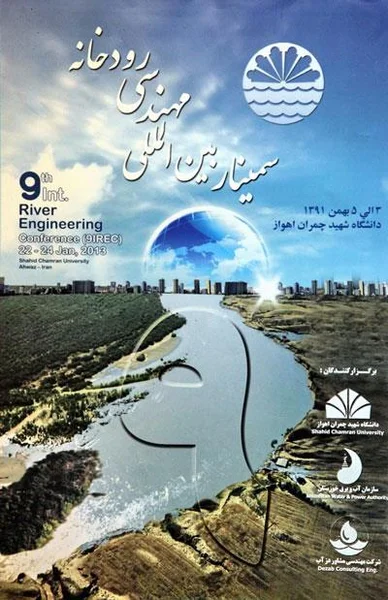-
management of a river reservoir using multi-objective particle swarm optimization technique
جزئیات بیشتر مقاله- تاریخ ارائه: 1391/11/03
- تاریخ انتشار در تی پی بین: 1391/11/03
- تعداد بازدید: 699
- تعداد پرسش و پاسخ ها: 0
- شماره تماس دبیرخانه رویداد: -
“water is elixir of life” is a notion which is accepted without exception. with increasing human population and consequent increasing human activities, coupled with decreasing natural resources, the need of water for survival has taken on added dimensions in recent years. progressive demand of freshwater supplies by accelerated human developments has made an already critical problem, even more acute. to combat this problem, techniques are being developed to ensure economic and optimal usage. in case of a dam constructed across a river, the river reservoir management during monsoon period is complicated due to conflicting objectives like flood control, irrigation, hydro power generation and conservation, which is relatively simple during non-monsoon period. river reservoir management is a complex problem that involves many decision variables, multiple objectives as well as considerable risk and uncertainty. in addition, the conflicting objectives lead to significant challenges for the managers while making operational decisions. traditionally, reservoir management is based on heuristic procedures, embracing rule curves and subjective judgements by the operator. this provides general operation strategies for reservoir releases according to the current reservoir level, hydrological conditions, water demands and the time of the year. established rule curves, however, do not allow a fine-tuning of the operations in response to changes in the prevailing conditions. traditional optimization techniques have failed to take care of non linearity and uncertainties. emerging soft computing heuristic techniques such as artificial neural network (ann), fuzzy logic, neuro-fuzzy (anfis), genetic algorithm (ga), ant colony optimization (aco), particle swarm optimsation (pso), multi-objective particle swarm optimization (mopso), etc. can be gainfully employed to handle such problems when conditions of the systems are uncertain. application of optimization techniques to reservoir operation has become a major focus of water resources planning and management. water use involves a large number of stakeholders with different objectives, and optimization technique like mopso is expected to provide balanced solutions between often conflicting objectives. this paper proposes an avenue for changing traditional reservoir operation into optimized strategies, taking advantage of the rapid development in artificial intelligence techniques.
مقالات جدیدترین رویدادها
-
استفاده از تحلیل اهمیت-عملکرد در ارائه الگوی مدیریت خلاقیت سازمانی و ارائه راهکار جهت بهبود
-
بررسی تاثیر ارزش وجوه نقد مازاد بر ساختار سرمایه شرکت های پذیرفته شده در بورس اوراق بهادار تهران
-
بررسی تأثیر سطح افشای ریسک بر قرارداد بدهی شرکت های پذیرفته شده در بورس اوراق بهادار تهران
-
بررسی تأثیر رتبه بندی اعتباری مبتنی بر مدل امتیاز بازار نوظهور بر نقد شوندگی سهام با تأکید بر خصوصی سازی شرکت ها
-
تأثیر آمیخته بازاریابی پوشاک ایرانی بر تصویر ذهنی مشتری پوشاک ایرانی (هاکوپیان)
-
روانشناسی رنگ در بیمارستان ها
-
اثر تزریق داخل بطن مغزی سیلی مارین بر مصرف تجمعی خوراک در جوجه های گوشتی محروم ازغذا در دوره پایانی
-
آنژین قلبی و گرفتاری شدید آئورت در هیپرکلسترولمی فامیلیال هموزیگوت – گزارش یک مورد نادر- پسربچه 10 ساله
-
high yield production of d-xylonic acid from d-xylose using engineered escherichia coli
-
performance of friction damper for dynamic response reduction of seismically excited knee braced steel frames
مقالات جدیدترین ژورنال ها
-
مدیریت و بررسی افسردگی دانش آموزان دختر مقطع متوسطه دوم در دروان کرونا در شهرستان دزفول
-
مدیریت و بررسی خرد سیاسی در اندیشه ی فردوسی در ادب ایران
-
واکاوی و مدیریت توصیفی قلمدان(جاکلیدی)ضریح در موزه آستان قدس رضوی
-
بررسی تاثیر خلاقیت، دانش و انگیزه کارکنان بر پیشنهادات نوآورانه کارکنان ( مورد مطالعه: هتل های 3 و 4 ستاره استان کرمان)
-
بررسی تاثیر کیفیت سیستم های اطلاعاتی بر تصمیم گیری موفق در شرکتهای تولیدی استان اصفهان (مورد مطالعه: مدیران شرکتهای تولیدی استان اصفهان)
-
مقدمه ای بر تحلیل هرمنوتیک و مفهوم آن در معماری
-
بررسی رابطه بین مهارت های ارتباطی و کیفیت زندگی دبیران
-
تحلیلی بر بزهکاری اطفال و نوجوانان در پرتو نظریه معاشرت ترجیحی و تعامل نمادین
-
problem of irony and intertextuality
-
a review on form a visual test of torrance creativity test in iran




سوال خود را در مورد این مقاله مطرح نمایید :